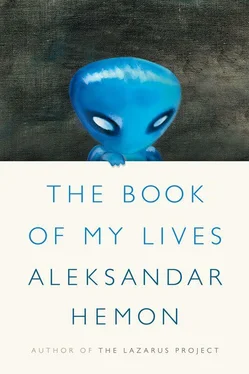Eventually, we found a way to act upon some of our revolutionary fantasies within a socialist youth institution, which gave us a space, ensured that we had no interest in getting paid, and made clear that we were not to overstep the borders of decent public behavior and respect for the values of socialist self-management. A few more friends joined us (Guša, living in London now; Goga — Philadelphia; Bucko — Sarajevo). We adorned the space with slogans hand-painted on bedsheets sewn together: “The fifth dimension is being created!” was one of them, straight from a Russian Futurist manifesto. There was an anarchy sign and a peace sign (a concession to the socialist-youth people) and Kasimir Malevich crosses, although we had to repaint some of them, because, in the blurry eyes of the socialist-youth hippies, they alluded to religion. This thing of ours was called Club Volens-Nolens, a ludicrously pretentious name.
We hated pretentiousness; it was a form of self-hatred. Planning the opening night, we had fierce discussions over whether to invite the Sarajevo cultural elite, the idle people who attended all the openings, and whose cultureness was largely conveyed by wearing cheap Italian clothes bought in Trieste or from the shady guys on the streets pushing contraband. One idea was to invite them, but to have barbed wire all over the place, so their Italian clothes would be subversively ripped. Even better, we could do the whole opening in complete darkness, except for a few stray dogs with flashlights attached to their heads. It would be fabulous, we agreed, if the dogs started biting the guests. But we realized that the socialist hippies would never go for that, as they had to invite some socialist elite to the opening in order to justify the whole project. We settled for inviting a few local thugs along with the elite, hoping that fights might break out, bloodying an upturned nose or two.
Alas, it was not to happen. No dogs, no bites, no fights — the opening was attended by a lot of people, who all looked good and behaved nicely. Thereafter we had programs every Friday. One Friday, there was a panel discussion on alcoholism and literature with all the panelists drunk, and the moderator the drunkest of all. For another Friday program, two comic-book artists came from Serbia to speak about their art and show their work in an exhibit. One of them got terribly drunk and stage-frightened, so he locked himself in the bathroom, refusing to come out. The audience waited while we begged him to open the stall. Eventually, he collected himself, left the security of the bathroom, and got on the stage, from which he hollered at the audience: “People! What is wrong with you? Do not be fooled by this. This is bullshit!” We loved it. Then there was the time when we showed a film called Rani radovi (The Early Works), suppressed in Yugoslavia because it belonged to the film movement from the sixties known as the Black Wave, which painted a not-so-rosy picture of socialism. It had never been shown in Sarajevo and we all wanted to see it, so we found a copy, rented a projector, and brought in the director from Belgrade, who was flattered by the invitation from a band of fawning young enthusiasts. The film was heavily influenced by Godard: young people walked around junkyards discussing comic books and revolution, and then made out with mannequins, those immortal symbols of consumerist alienation. The projectionist, conditioned by the soft demands of soft porn, switched the reels and showed them out of order. Nobody noticed except the director, who was tipsy and excited that his film was being shown at all. We organized a performance of John Cage’s music, the first (and possibly the only) one ever in Sarajevo: we played records with a composition performed by twelve simultaneously screeching radios, and the infamous “4:33”—a stretch of silence on the record which was supposed to provide the time for the audience to create its own inadvertent, incidental music. The audience, however, consisting by this time mainly of the idle elite, didn’t notice that “4:33” was playing at all, didn’t give a diddly fuck about the music it was itself producing, and was, instead, getting happily drunk. Then the performer, who had traveled to Sarajevo forgoing a family vacation at the peril of divorce, stepped in front of the microphone. The few audience members who glanced at the stage saw a hairy man eating an orange and a banana in front of the microphone, performing, unbeknown to almost everyone present, the John Cage composition appropriately titled “An Orange and a Banana.”
It was irritating not to be irritating to the elite, so even on the nights when we just spun records, the goal was to inflict pain: Guša, the DJ, played Frank Zappa, Yoko Ono screaming in dissonance, and Einstürzende Neubauten, the fine German musicians who liked to use chain saws and power drills to produce music. The elite was undeterred, though it shrank in numbers — we wanted them to be there so as to experience severe mental pain. This concept did not fly too well with the socialist hippies.
The demise of Club Volens-Nolens (which means “willy-nilly” in Latin) was due to what is usually called “internal differences”—some of us thought we had made too many compromises: the slide down the slippery slope of bourgeois mediocrity (the socialist version) had clearly begun when we gave up the stray dogs with flashlights. Before we called it all off, we contemplated having stray dogs, this time rabid, for the closing night. But Club Volens-Nolens went out with a whimper, rather than a mad bark.
After the demise, we sank back into general ennui. I busily wrote self-pitying poetry, eventually accumulating about one thousand dreadful poems, the subject of which flip-flopped between boredom and meaninglessness, with a dash of hallucinatory images of death and suicide. Like many young people raised in the comforts of socialism, I was a nihilist and living with my parents. I even started thinking up an Anthology of Irrelevant Poetry, sensing that it was my only hope of ever getting anthologized. Isidora was willing to do it, but nothing came of it, although there was a world of irrelevant poetry everywhere around us. There was nothing to do, and we were quickly running out of ways to do it.
2. THE BIRTHDAY PARTY
Isidora’s twentieth birthday was coming up, and she — ever disinclined to do it the normal way — did not want it to have the canapés-booze-somebody-fucking-in-the-bathroom format. She thought that it should have the form of an art performance. She couldn’t decide whether it should be modeled on a “Fourrieristic orgy” (the idea I favored) or a Nazi cocktail reception, the template for which could be found in the patriotically proper movies of socialist Yugoslavia: the Germans, all haughty, decadent bastards in impeccable uniforms, throwing a lavish party, in 1943 or so, while local whores and “domestic traitors” lick their tall, shining boots, except for a young Communist spy who has managed to infiltrate the inner circle and who will make them pay in the end. For some unfortunate reason, the orgy lost out to the Nazi party.
The birthday party took place on December 13, 1986. The young men donned black shirts and had oil in their hair. The young women wore dresses that reasonably approximated gowns, except for my teenage sister, who was cast as a young Communist girl, so she wore a girly Communist dress. The party was supposed to be taking place sometime in the early forties, right after the beginning of the German occupation. The narrative featured all the implicit decadence seen in the movies, and then some pseudonihilistic whimsy. There were mayo swastikas on the canapés; there was a sign on the wall saying “In Cock We Trust”; there was a ritual burning of Nietzsche’s Ecce Homo in the toilet; my sister was detained as a young Communist in one of the rooms, designated as a makeshift prison; Guša and I fought over a bullwhip; Veba (who lives in Montreal now) and I sang pretty, sad Communist songs about fallen strikers, which we liked to do at every party; I drank vodka out of a cup and wore tall boots, as I was cast as a Ukrainian collaborator. In the kitchen (you can always find me in the kitchen at parties) we discussed the abolishment of the Tito cult and the related state rituals, still running strong. We entertained the idea of organizing demonstrations: I would be looking forward, I said, to smashing some store windows, as some of them were ugly and I liked glass shards. There were people at the party and in the kitchen whom I didn’t know, and they listened very carefully. The morning after, I woke up with a sense of shame that always goes with getting too drunk, usually remedied by a lot of citric acid and sleep. Yet the sense of shame wouldn’t go away for a while. Indeed, it is still around.
Читать дальше












